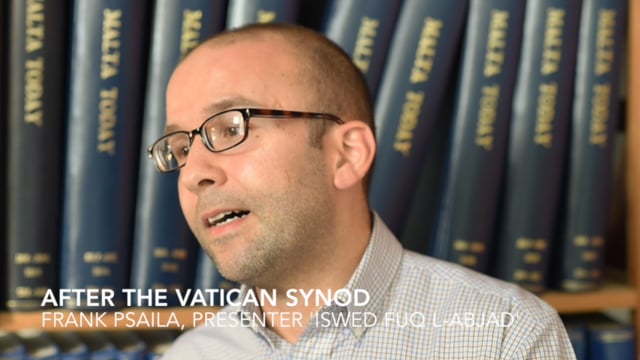Cliques within the church are preventing change – Fr Rene Camilleri
Some chaplains look at village feasts as a crucial means of attracting people into the Church, former head of the Church's environmental commission Prof. Victor Axiak, says.

Video is unavailable at this time.
A ‘clique’ within the Curia that has been present for the past 30 years could prevent the new Archbishop from regenerating the church, head of the Curia’s secretariat for catechesis Rene Camilleri said.
“The same people remained within the Curia, such as its administration and tribunal, after Paul Cremona was appointed Archbishop,” Camilleri said. “I am not judging the competency of these people, but how can we pretend that things will change within the church if the people running it don’t change? The Curia should change alongside the new Archbishop.”
He was speaking on Monday night’s edition of Reporter that discussed the role and relevance of the Maltese Church in light of Paul Cremona’s historic resignation as Archbishop earlier this month.
Video is unavailable at this time.
Camilleri said that the Church should place people, rather than doctrine, at the top of its agenda. He praised Pope Francis for doing just that when he called the Extraordinary General Assembly of the Synod of Bishops, a synod that was held earlier this month and which Gozo Bishop Mario Grech attended.
“In previous synods, the bishops just spoke about Church doctrine,” Camilleri said. “I’m not saying that doctrine is a waste of time, but what made this synod a great one was that the Pope told the bishops that the Church needs to start focusing on people.
“The Church shouldn’t lose sight of the people through all the doctrine. It should have no reason to exclude people; it was born to include people.”
Yet he pointed out that this wave of dogmatic change has taken its time to reach Malta.

“Change in the Maltese church happened too slowly, which caused a lot of people to lose both interest and faith,” Camilleri said. “Yet the Church is not a club and it shouldn’t concern itself with expanding its members. What is pre-occupying about people moving away from the faith is that the Church’s reason for existence is the people out there who need salvation.”
Former Swieqi parish priest Gorg Dalli, a critic of the Curia, said that the Church belongs with the people who are most in need, as Jesus and Mother Teresa had shown.
“If people feel that they are in need of Jesus, they should find the church waiting for them,” Dalli said. “This recent synod was different to previous ones as it focused on how the church can get down to these people. Maybe God thought it was time for it…”
“The church is not the cliques within the Curia, it is the people,” Dalli said, pointing to the several church NGOS that “do a lot of their work in silence”.
“Some people are fully in favour of the church, some are simply not interested in it, but the majority is sitting on the fence and they need the church to reach out to them,” previous Nationalist MP Michael Asciak said. “A lot of people, such as separated people in new relationships, live parts of their lives against the church’s doctrines but still go to mass. Their will is there. The church has its own objective rules but it must emphasize individual circumstances.”
As an example, Asciak said that the church should look at homosexual people according to their ‘grade’ of homosexuality.
“Homosexuality comes in grades and the church should treat people who are born gay differently to those who have a choice,” he said.
Meanwhile, former head of the Church’s environment commission Victor Asciak was content to leave the Church’s future in God’s hands. When asked whether the Church could one day accept abortion in cases of rape, he said “All I am certain of is that God surprises of, so who knows?”
All four speakers unanimously agreed that the Church should not be used as a political ball.
“The era of the church as a political ball is over, but it can still remain relevant in Malta by being a moral leader that nothing can substitute,” Rene Camilleri said.
Yet poet Immanuel Mifsud, an opinionist on Monday’s progamme, said that Church leaders find it hard to come to a consensus on several issues.
“We tend to think of the church as a homogenous institution but it’s shown time and again that it isn’t,” Mifsud said.
The village feast question
The topic of Malta’s traditional village feasts and their link to the Church also rose up.
“I’m worried that a lot of chaplains use these feasts to rope people into the Church,” Victor Asciak said. “I’ve heard chaplains saying ‘Thank god there are village feasts, because otherwise how will we bring people into the church?’”
“The Church can’t keep banking on the village feasts,” Rene Camilleri said. “It banks on them because there is an emptiness within the Church.”
“Village feasts don’t belong to the Church but to the village square, the band clubs and the decorators,” Gorg Dalli said. “The only religious aspect of it is when the statue comes out of the church.”
“Seeing all the vulgarity at the village feasts makes me doubt whether the Maltese people are actually religious,” Immanuel Mifsud said. “I seriously doubt whether the Maltese people really care about the Church. The majority of Maltese have always seen the Church more as a cultural phenomenon rather than a religious one.”
Live current affairs programme Reporter is presented by Saviour Balzan and produced by MediaToday. The programme’s new format includes lawyer Ramona Frendo as a resident opinionist.
Reporter is aired live every Monday at 9.45pm on TVM 1

.png)




















